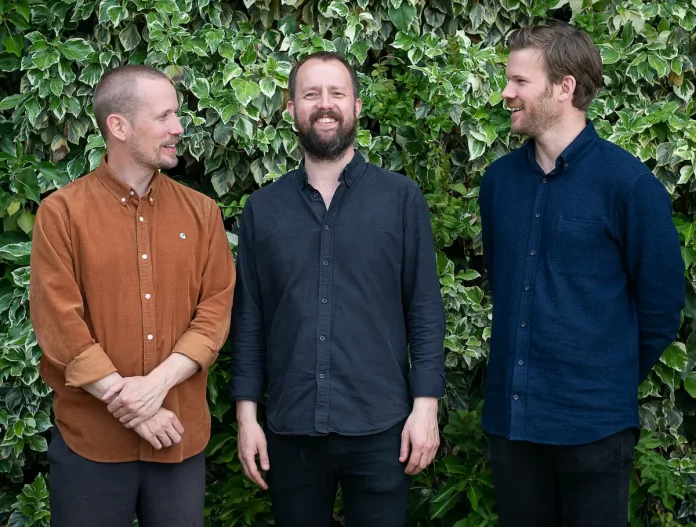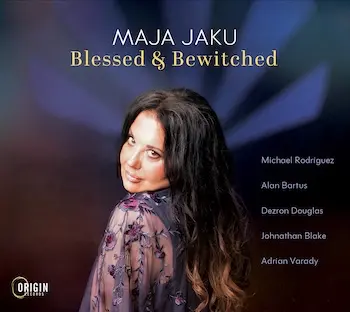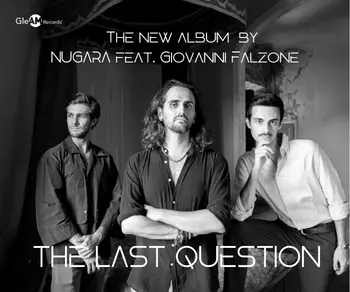If you were to listen to these three contrasting albums back-to-back you’d soon realise that the commonly voiced stereotypes about Scandinavian jazz are deeply flawed. Illustrating the great breadth of the sub-region’s many diverse music scenes, they barely scratch the surface of what’s currently on offer.
Morten Haxholm: Aether II (Zack’s Music MHA2501)
We begin with a Dane who, after more than a decade in New York, recently returned to his spiritual roots. A graduate of Copenhagen’s prestigious RMC, bassist Morten Haxholm surprised many with the cool, uncluttered and very contemporary sound of his 2023 album Aether. Broadly European in its sense of melancholy and handling of space, its sophisticated melodies and near flawless arrangements recalled contemporary ECM artists such as Mathias Eick and Jakob Bro.
Aether II reunites the core quintet of Lubos Soukup (ts, cl), Nikolaj Hess (p, elp), Rasmus Oppenhagen Krogh (elg) and Jakob Høye (d), but crucially they’re augmented on several tracks by Casper Hesselager (kyb, elec). Expanding the group’s sonic range, his modular synths and sound processing subtly blur the music’s edges without compromising its fundamentally acoustic qualities. All of the pieces are inspired by people, places and events close to Haxholm’s heart, and from the get-go it’s clear this very intimate music is a window into his interior life.
Following a short mood-setting intro, Silveon pirouettes around an attractive West African style chord sequence, Soukup and Oppenhagen Krogh soloing in parallel. Untethered is a little more urgent, as if reaching for something unobtainable, while the dreamy tremolos of Coda underscore Hesselager’s invaluable contribution. Hess’s exquisite touch and fecund lyricism lift the nostalgic ballad Magnolia, and he switches to Rhodes for the rhythmically buoyant Siren Song. Oppenhagen Krogh’s oscillating chords on Shimmers are completely mesmerising, while the closing Incarnadine, a free-floating ballad, sees trumpeter Tomasz Dąbrowski making a breathy and all too brief cameo. Superb.
Benedicte Maurseth: Mirra (Hubro CD2667)
If Nils Økland is perhaps the best-known contemporary exponent of the traditional Hardanger fiddle, Benedicte Maurseth, a one-time pupil of Knut Hamre, is steadily making up ground. This long awaited follow-up to 2022’s Nordic Music prize-winning Hárr revisits the same northern landscapes, its eight evocative soundscapes fusing improvisation with traditional folk music, ambient field recordings and minimalism. Thanks to Jørgen Træn’s on-point production and Mirra’s more electro-acoustic feel in comparison to its predecessor, the ghostly overtones and natural sustain of Maurseth’s principal instrument have rarely sounded so striking.
Mirra is old Hardanger dialect for the circling motions of teeming reindeer as they ward off predators or simply keep warm, hinting at the album’s central theme. Recordings of the animals’ cries, grunts and snorts are woven into the music’s fabric, and Maurseth leads us through some of the most significant events in their annual cycle. Bringing her music to life are Mats Eiltertsen (b, elec), Håkon Stene (vib, pc, g, elec) and Morten Qvenild (kyb, elec), who also recorded the session. Each piece seems to grow organically from the scenes and landscapes that inspired them.
The repetitive minimalist loops and ambient sounds of the title track create a palpable sense of movement, conjuring images of the animals’ graceful passage. The swaying movements of Sommarbeite (“summer grazing”) and the eery Kvitkrull (“white curl”) introduce unexpected echoes of the kosmische music of the 70s, while Kalvin Reise Seg (“the calf rises”) is as intimate as it is timeless, Maurseth’s earthy fiddle and sparse percussion mimicking an infant’s first tottering steps. Qvenild’s glistening piano duets with the animals on Nysnø Over Reinlav (“fresh snow on reindeer moss”), and the closing Simleflokk Under Månen (“flock of birds under the moon”) builds to a striking climax after a sequence of gripping improvised exchanges. As the music dissipates it’s fitting that the final voices we hear are those of the reindeer. A profoundly moving piece of work, and further industry awards surely await.
Gard Nilssen Acoustic Unity featuring Signe Emmeluth & Kjetil Møster: Great Intentions (Action Jazz ACJZ011)
It may seem counterintuitive, but the fiery free jazz of Great Intentions is the most unreconstructed and traditionally leaning of the three albums covered in this month’s column. Almost 60 years have passed since the seminal mid-60s works of Coleman, Dolphy, Coltrane and Ayler, but the music has lost none of its power to confront. Norwegian drummer Gard Nilssen (b. 1983) is at the forefront of a new wave of artists championing the style, and his group Acoustic Unity is currently celebrating its 10th anniversary.
To mark the occasion Nilssen and regular bandmates André Roligheten (ts, ss, bs, bcl, f) and Petter Eldh (b) convened at Ocean Sound Studio on Norway’s western coast in December of 2024. The trio was expanded to a quintet with the addition of Kjetil Møster (ts, bar) and Signe Emmeluth (as, f), boosting the available fire power and allowing Nilssen to unlock new harmonic possibilities within the group’s famously tight arrangements. Each player brought at least one composition to the sessions, and this lovingly conceived and well-paced set was mixed and produced by the seemingly omnipresent Jørgen Træn.
The album has a relatively sedate opening thanks to the positively Ellingtonian horn voicings of Rohligheten’s Swedish Delight. Nilssen and Rohligheten’s Telemark Twist introduces a Township feel via Chris McGregor, and Emmeluth’s dancing alto is a real joy. The complex interlocking grooves of Eldh’s Bankebrett provide a constantly shifting backdrop to a meticulously drilled theme, and in possibly the biggest surprise of the set there’s a cover of Paul McCartney’s Waterfalls, an oasis of calm before the raucous baritone vamp of Møster’s hard-grooving Ostronology. The taut unisons of John Wayne and Dancing Flowers recall the Vandermark 5 at their best, while Møster’s The Root is a cleansing 10-minute tour de force. In one final surprise, singer and guitarist Jonas Alaska affirms Nilssen’s belief that music is a powerful healer, emerging from the dust to serenade us with a brilliantly offbeat coda. An unruly garage-band cousin to 2022’s exquisitely produced Elastic Wave (ECM), perhaps, but the two albums are equally essential.




